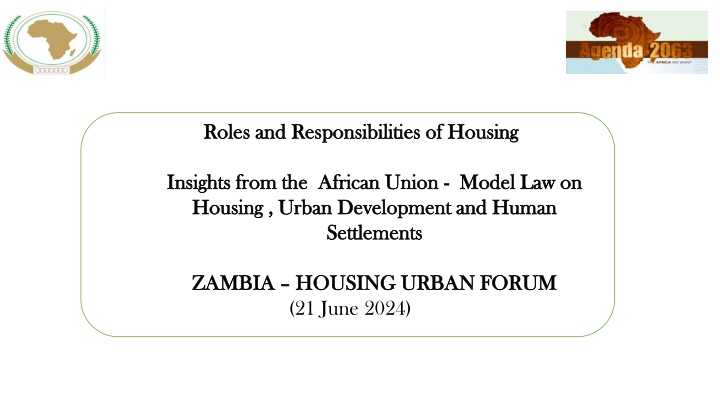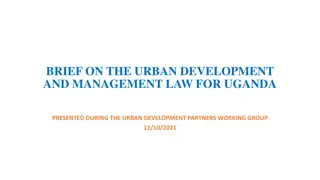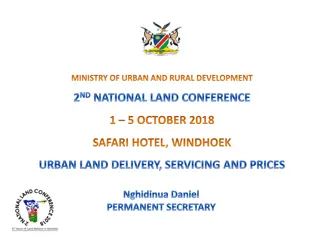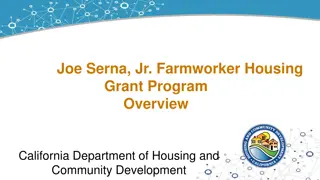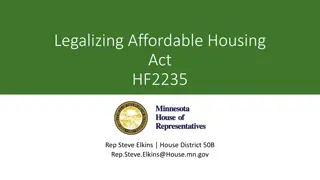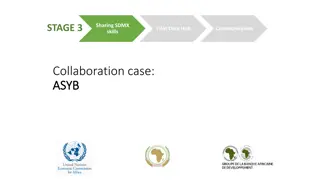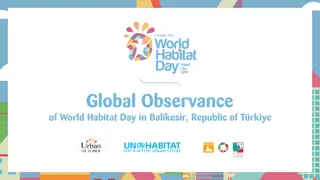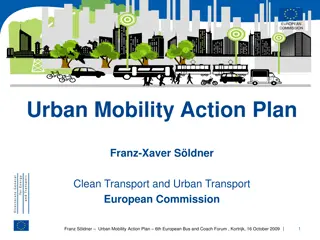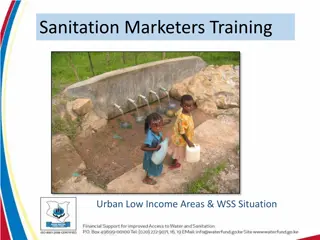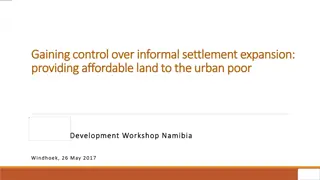Responsibilities and Insights from African Union on Housing and Urban Development
The African Union has emphasized the importance of a coordinated African response to urbanization challenges through a Model Law on Housing, Urban Development, and Human Settlements. The focus is on integrating international commitments into national legislation to enhance urban management, ecological sustainability, and prosperity. The Model Law aims to guide legislators in designing effective laws adaptable to diverse country contexts.
Download Presentation

Please find below an Image/Link to download the presentation.
The content on the website is provided AS IS for your information and personal use only. It may not be sold, licensed, or shared on other websites without obtaining consent from the author.If you encounter any issues during the download, it is possible that the publisher has removed the file from their server.
You are allowed to download the files provided on this website for personal or commercial use, subject to the condition that they are used lawfully. All files are the property of their respective owners.
The content on the website is provided AS IS for your information and personal use only. It may not be sold, licensed, or shared on other websites without obtaining consent from the author.
E N D
Presentation Transcript
Roles and Responsibilities of Housing Roles and Responsibilities of Housing Insights from the African Union Insights from the African Union - - Model Law on Housing , Urban Development and Human Housing , Urban Development and Human Settlements Settlements Model Law on ZAMBIA ZAMBIA HOUSING URBAN FORUM HOUSING URBAN FORUM (21 June 2024)
The Decision The Decision AU AU- -STC.No.8 STC.No.8 Decision 29 of the (AU) Assembly, Heads of State and Government called for a coordinated African response to the challenges of urbanization. On 19 October 2018 in Cotonou, Benin, the AU Specialised Technical Committee on Public Service, Local Government, Urban Development and Decentralization (AU-STC No. 8) highlighted the need for a Charter on Urban Development and Human Settlements as a mechanism to enhance management of coordinated urbanisation, ecological issues and prosperity Justification Justification : : The Model Law will serve as an entry point to the development of the charter. Facilitate AU- member states ability to meet their international and regional commitment; Agenda 2023 and SDG II, New Urban Agenda, Agenda 2063,/ Assist legislators in translating obligations emanating from these commitments into detailed national legislation. Intended as a guide to promote meaningful legislative design, but it is important to note that, to be conducive to good legislation and effectiveness, it needs to be adapted to country . contexts.
Table Table 1. 1. 1. 1. 1. 1. 1. 1. 1. 1. 1. 1. 1. 1. 1. 1. 1. 1. 1. 1. 1. 1. 1. 1. 1. 1. 1. 1. 1. 1. 1. 1. 1. 1. 1. 1. 1. 1. 1. 1. 1. 1. 1. 1. 1. 1. 1. 1. 1. 1. 1. 1. 1. 1. 1. 1. 1. 1. 1. 1. 1. 1. 1. 1. Subject Subject Page Page 3 5 7 8 10 12 14 15 16 18 19 20 23 24 26 26 27 28 29 30 31 32 33 35 39 40 41 42 44 49 51 52 Laws and Policies: Urban Development and/or Spatial Planning Laws and Policies: Housing and Human Settlements Levels of Government: Operation of Laws and Policies Land Reform Policies and Impact How land-use, tenure systems, vulnerable groups, affordability and access are addressed Inclusion of Climate Change Adaptation and Mitigation Inclusion of Migrants or Displaced People Cooperation between Different Levels of Government Cooperation between Local Government and Sectoral Authorities Strengthening Multi-level Governance Urban Plans Based on Digital Information Use of Technology Provisions in Law for Financing Housing and Urban Development Stakeholders: Financing Urban Development and Housing Participation of Private Construction Sector Programmes to Generate Domestic Revenue to Finance Urban Development Institutional Arrangements for Service Delivery and Decision-Making Partnerships Responsibilities of Local Government Transparency and Accountability in Decision Making Local Government s Challenges Capacity Building Programmes for Local Governments information and databases for Urban Planning Proportion of Households with Access to Affordable Housing Informal Settlements: Challenges, Legal Framework and Upgrading Strategies Rights of Women and Vulnerable Groups Integration of Population Development Issues into Programmes Programmes to Communicate Importance of Urban Land Protection against Forced Evictions Standards, Regulations Processes Planning Tools and Levels of Enforcement Effective and Enforced Building and Planning By-Laws and Regulations Framework for Compatibility between Local, Regional and National Plans Requirement for Urban Plans to Integrate Informal Areas into City Planning Mechanisms for Affordable Housing Monitoring, Reporting and Revision Mechanisms Challenges and Suggestions 1. 1. 1. 1. 1. 1. 54 56 57
Methodology Methodology Desk top research ( literature, policy and legislative review) Questionnaire administration through - Member Sates Government , Key Stakeholders in the urban and housing fields. AU- Reports and publications of regional and international reports and other sources. Decisions, documents and model laws The development of the Model Law has been underpinned by the findings outlined in a Background Report. Report provides literature review and analysis of urban development and housing in the different regions of Africa, focusing on legislative and policy implementation, challenges, gaps and opportunities. This explores the current status of the implementation of housing, urban development, and human settlements regulations, standards, and planning tools with a focus on their consequences and values and principles for sustainable urbanization and the provision of affordable housing. It uses case studies to highlight good practices and examines possible reasons for limited adoption of standards, regulations and planning tools. The report provides initial recommendations for improving the process for adopting and ensuring effective implementation of standards, regulations and planning tools at different levels.
Feedback Feedback A questionnaire was circulated to Member States by the AUC in December 2023. Since there were no responses by February, a renewed effort was made, under the guidance of the Steering Committee, to reach the relevant officials within the AU Member States. Responses were received from the following twelve (12) MS: Egypt Ghana Lesotho Mauritania Mauritius Niger Senegal Tanzania Togo Zambia Zimbabwe Uganda
Synoptic Synoptic - - Key concerns Key concerns Not all MS have a bill of rights in their constitution / Housing basic human right Lack of adequate housing, insecurity of tenure, environmental problems, epidemics and diseases and scarcity of land for housing. Low percentage access ( 30% percent ) of access to affordable housing Costing less than 30% of their income. Lack of particular programmes targeted at financing urban development and housing No clear mechanism for ( incentives ) to ensure that adequate amount of affordable housing directed at lowest income group is produced by the market. Exclusion ( Local Authorities) in policy formulation, financing and project design.
Synoptic Synoptic - - Key concerns Key concerns Limited access to the necessary information and data- base for housing and urban planning by the Local Authorities. Weak / ineffective building and planning by-laws and regulations Policies and laws that still do not include climate change adaptation and mitigation considerations Exclusion of migrants and displaced people in urban planning No dedicated Ministries for Lands/Urban/ Housing/Human Settlements Limited allocation of resources and revenues Law implementation challenges Non focus of this presentation ( complex governance structure, overlapping roles and responsibilities, outdated legislation, poor design of planning and housing laws,
Synoptic Synoptic Good practices Good practices There are many instances of good practices in the development and implementation of urban and related policy and legislation throughout Africa. Some of these have been highlighted below, as examples. Upgrading of informal settlements: Kenya and Malawi Flexible land tenure options and tenure regularisation: Namibia, Zambia and Rwanda Land management and land governance: Botswana Multi-stakeholder consultation: Liberia and Kenya Citizen monitoring of government infrastructure: Nigeria Flexible, context-specific planning and building standards: Botswana Improved finance for housing: Niger and Senegal Improved inter-municipal collaboration and planning around environmental issues: Rwanda and Senegal . e-Service provision - Rwanda Dedicated urban ministry: Kenya and Morocco Backyard housing: South Africa
Housing roles and responsibilities Housing roles and responsibilities Member States Ministers should be responsible to ensure that: Every person has the right to access affordable, safe, and habitable housing, progressively realising this right, particularly for vulnerable and marginalised groups. Mechanisms are established to incentivize the construction of affordable housing, including tax incentives and subsidies for developers committed to providing affordable units, and public and private sector partnerships. Housing standards and regulations set forth realistic minimum standards for housing quality, safety, and habitability. There is enforcement of these standards, including building codes, zoning regulations, and land use planning measures to prevent substandard housing conditions and to manage informal settlements.
Housing roles and responsibilities Housing roles and responsibilities Property owners and occupants shall adhere to building codes and standards, maintain their properties, and contribute to the overall well-being of the community. Policies are implemented to regulate and monitor rental markets, preventing unjust and arbitrary rent increases while ensuring fair and transparent leasing practices. Programmes are implemented to facilitate the development and maintenance of affordable housing, including subsidies, incentives, and partnerships with private and non-profit sectors. Provisions are made for social housing initiatives to address the housing needs of low-income and vulnerable populations, with an emphasis on inclusivity and community development.
Infrastructure & Services , Sustainable Development and Infrastructure & Services , Sustainable Development and Environment Environment Infrastructure and Services Infrastructure and Services Resources are allocated for the development and maintenance of essential infrastructure, such as roads, water supply, sanitation, and energy, to support both urban and rural communities. Access to education, healthcare, and other essential services in urban planning to ensure the well- being of all residents are prioritised. Partnerships with the private sector to enhance the efficiency and innovation in infrastructure projects are fostered. Sustainable Development and Environment Sustainable Development and Environment Integrate environmental sustainability principles into urban planning and development, promoting green spaces, energy-efficient technologies, climate resilience and waste management strategies. Make efforts to protect, preserve and promote cultural heritage within urban development plans, respecting the identity and history of all communities in the area.
AFRICA URBAN FORUM 4-6 SEPTMBER 2024
